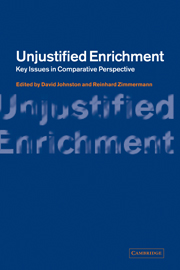Book contents
- Frontmatter
- Contents
- List of contributors
- Preface
- Table of cases
- List of abbreviations
- I Introduction
- II Enrichment ‘without legal ground’ or unjust factor approach
- III Failure of consideration
- IV Duress and fraud
- V Change of position
- VI Illegality
- VII Encroachment and restitution for wrongs
- VIII Improvements
- IX Discharge of another person's debt
- 16 Performance of another's obligation: French and English law contrasted
- 17 Payment of another's debt
- X Third-party enrichment
- XI Proprietary issues
- XII Taxonomy
- Index
16 - Performance of another's obligation: French and English law contrasted
Published online by Cambridge University Press: 31 July 2009
- Frontmatter
- Contents
- List of contributors
- Preface
- Table of cases
- List of abbreviations
- I Introduction
- II Enrichment ‘without legal ground’ or unjust factor approach
- III Failure of consideration
- IV Duress and fraud
- V Change of position
- VI Illegality
- VII Encroachment and restitution for wrongs
- VIII Improvements
- IX Discharge of another person's debt
- 16 Performance of another's obligation: French and English law contrasted
- 17 Payment of another's debt
- X Third-party enrichment
- XI Proprietary issues
- XII Taxonomy
- Index
Summary
‘Performance’ of obligations by persons other than those who bear them, far from being exceptional, is an everyday occurrence under both the French and English systems of law. It is the purpose of this article to explain how this is the case in particular in relation to contractual (and private-law obligations and to explain how this relates to more general issues of performance (whether voluntary or enforced), damages (notably, the rules clustered around the notion of mitigation) and restitutionary recovery. As my title indicates (and, indeed, as the structure of the French law requires), I shall discuss the performance of obligations in general and not merely those to pay money. The juxtaposition of two provisions of the French Civil Code forms the starting point of the discussion: the first, article 1236, is the obvious one, as it deals with the situations in which the law permits the performance of another's obligation by a third party; the second, article 1144, is less obvious, as it provides for judicial authorisation of a creditor of a contractual obligation to have the debtor's obligation performed at the debtor's expense.
A note on terminology
In the following discussion, it seems helpful to set out the French terminology and explain its usefulness for analysis of the two situations. Here, it is necessary to distinguish carefully between obligation, prestation and paiement.
- Type
- Chapter
- Information
- Unjustified EnrichmentKey Issues in Comparative Perspective, pp. 433 - 457Publisher: Cambridge University PressPrint publication year: 2002



